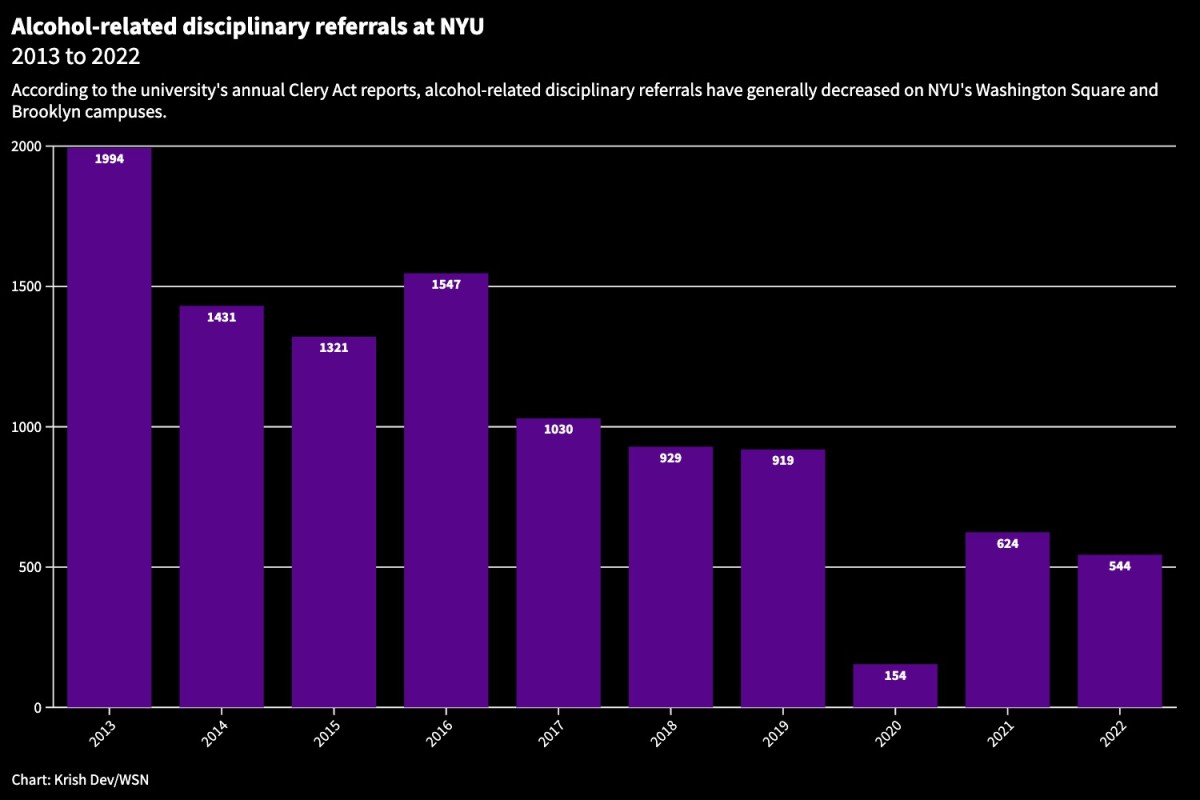The Department of Campus Safety’s 2023 Annual Security and Fire Safety Report showed a decrease in disciplinary referrals for liquor law violations at the university, with an around 13% drop in violations from 2021 to 2022.
Data from the annual report, released in accordance with the Clery Act — a federal law that requires colleges to disclose campus crime information — show a general decrease in alcohol-related violations on NYU’s Washington Square and Brooklyn campuses over the last nine years. In 2013, there were 1,994 disciplinary referrals, whereas the most recent data shows 544 disciplinary referrals in 2022.
Carlo Ciotoli, executive director of the NYU Student Health Center, said the university’s drinking culture is significantly safer than that of other universities given the abundance of alcohol-alternative opportunities students can take part in throughout the city.
“Students drive less, and Greek and athletic life — activities that are commonly associated with high risk drinking at other universities — function differently at NYU,” Ciotoli wrote to WSN. “When NYU students choose to drink alcohol, fewer students intend to get drunk and fewer students engage in very high risk drinking episodes that are more likely to cause serious negative consequences, such as blackout, injury, unprotected sex or death.”
NYU prohibits alcohol at any event where the majority of attendees are under the legal drinking age, according to its Substance Abuse and Alcoholic Beverages policy. Events with alcohol are expected to be “adequately supervised” and must ensure some “mechanism” to restrict who has access to the alcohol provided.
Other New York City schools, including Columbia University and Fordham University, require additional proof of age if there’s reason to believe there are any underage attendees at an event, and schools like Stony Brook University and The New School require the use of a wristband or ticket system.
Prior to the beginning of the academic year, first-year students at NYU are required to complete AlcoholEdu for College, an online course that reviews good practices surrounding alcohol consumption. Ciotoli said the purpose of the program is to ensure that all students are aware of resources related to alcohol use before starting the school year.
Sophomore Nicole Luo said while the knowledge she gained through completing the program was useful, she doesn’t think it will change some students’ desire to drink.
“It is not a very effective program or training, because the knowledge included in this type of program is common sense, or ideas that we already know,” Lou said. “Alcohol is a personal choice. What you want to do, no matter what other people tell you, you’re going to do anyway.”
The university’s policy also prohibits alcohol in any on-campus area, regardless of a student’s age. Policies that pertain to on-campus residence halls strictly ban alcohol use for underage students. Student organizations are also unable to use university funding to supply alcohol at events, with exceptions on a case-by-case basis for graduate students.
Initial violations to NYU policies that don’t result in significant harm to oneself or others generally result in a mandated “educational project,” and can also end in residential probation, campus service and education or counseling referrals. Repeated violations can lead to parental notification, dean notification, and residence hall relocation, suspension or dismissal.
“Any institution needs to walk a line between upholding local and state laws and university expectations, on the one hand, and providing concrete risk reduction-based education to students who might choose to drink or those who might care for them,” Ciotoli said. “The aim is to provide a law-abiding environment where the community follows norms while working to minimize barriers to help-seeking.”
Contact Dharma Niles at [email protected].
























































































































































